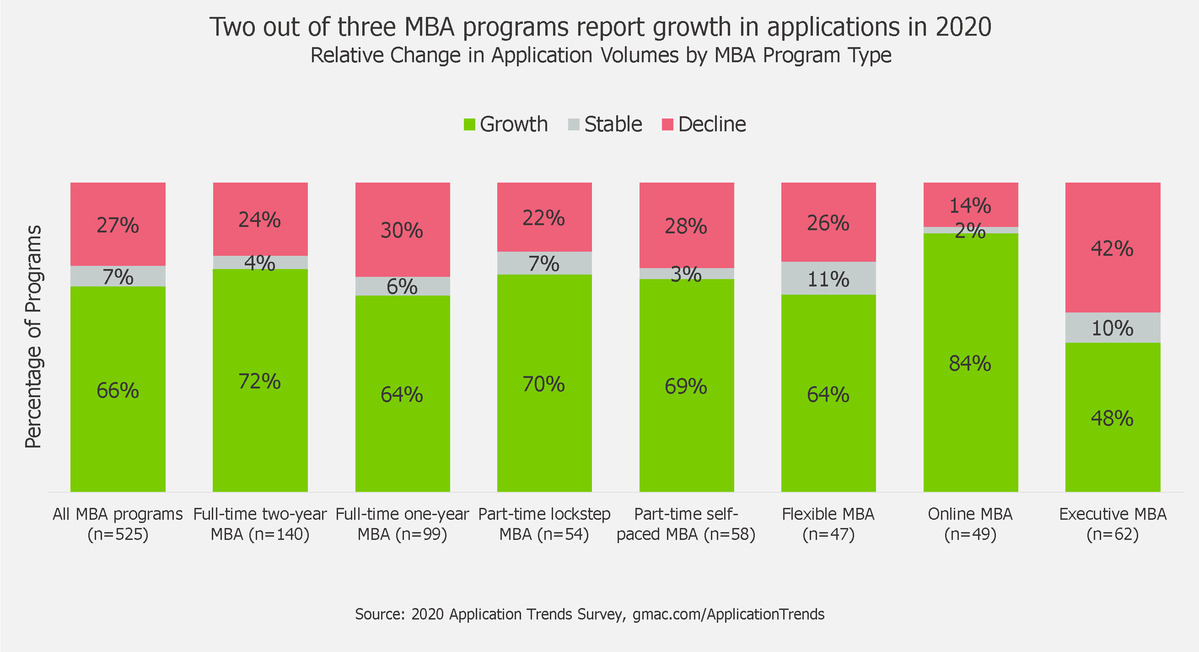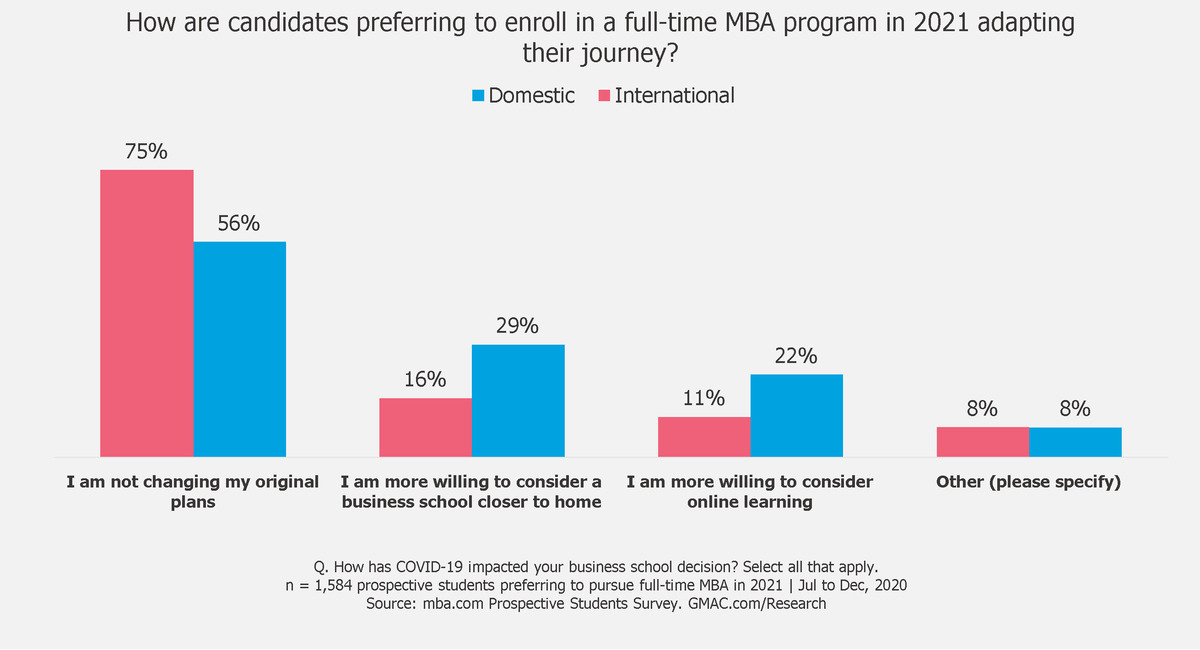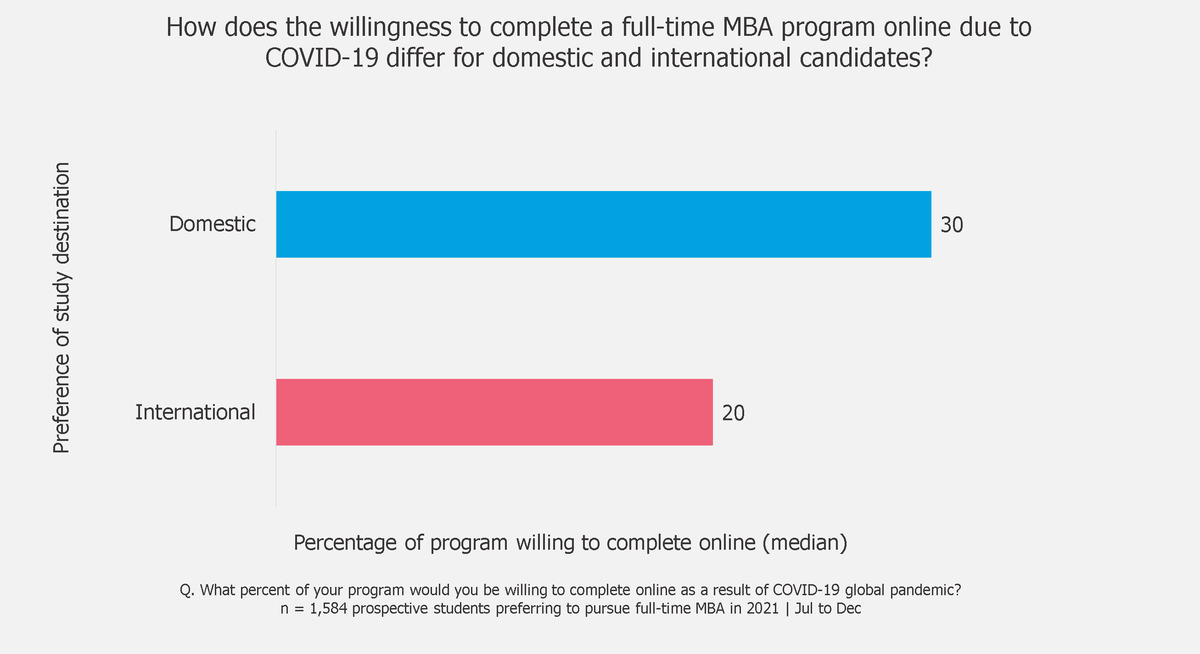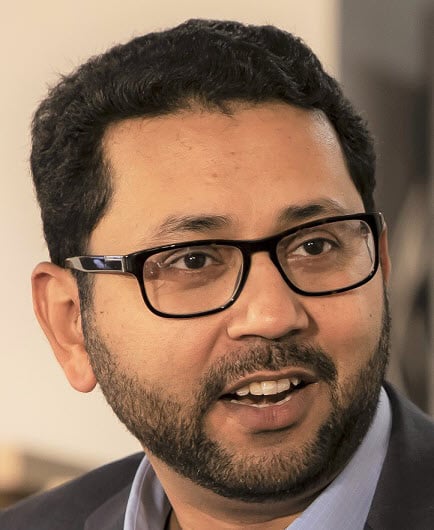Findings from GMAC™ snapshot survey of prospective students considering full-time MBA programs shows that candidate journeys are shifting in the context of pandemic-induced uncertainty. This suggests that a sustainable future of full-time MBA programs would require business schools to understand the nature and direction of evolving candidate journeys and engage the best-fit, diverse prospects for better enrollment yield.

The context of graduate management education had been evolving for over a decade. In 2010, Srikant Datar, now dean of Harvard Business School, analyzed the changing landscape of MBA education and asserted, “…[t]o remain relevant, business schools will have to rethink many of their most cherished assumptions.”
More recently, COVID-19 forced many business schools around the world to adapt to the pandemic and revisit their assumptions. “The fundamental economics and geography of HE [higher education] are being challenged by COVID‐19”, said Steve Brammer, Dean of the School of Management at the University of Bath, and Timothy Clark, Provost of Singapore Management University.
Many forces, including the changing nature of the work and workplace, are also accelerating the transformation of business schools. Sandeep Krishnamurthy, Dean at the School of Business, University of Washington, Bothell, argues that “The business schools currently face a once-in-a-lifetime shift to emergency remote teaching….This disruption is going to lead to a decade-long technology-led remaking of business education.”
How are candidate journeys and perceptions for full-time MBA programs shifting in these times of disruption and change?
The GMAC survey of applications to graduate business programs shows that COVID-19 has reconfigured the enrollment funnel. Applications were up at many business schools, albeit with higher deferrals (especially from international candidates) and lower yields. The 2020 survey shows that more full-time MBA programs reported growth in applications from domestic candidates (65%) than for international candidates (56%). Deferrals rates (median) for all full-time MBA programs more than doubled, to reach 8 percent in 2020 compared to 3 percent in 2019. This is consistent with the findings of the survey snapshot that international MBA candidates were more likely to request deferrals if programs started with online learning.

Looking ahead to the 2021 application season, the demand for GME may remain robust in the context of the pandemic-induced economic downturn. However, the journeys of some candidates may be shifting in terms of their considerations and preferences. According to the GMAC survey snapshot of prospective students who prefer to enroll in full-time MBA programs in 2021, international candidates (75%) are more likely to report that they are not changing their original plans than domestic candidates (56%). Much of the change among domestic candidates are driven by a desire to stay closer to home (29%) or adopt online learning (22%). International candidates are also more likely to consider staying closer to home (16%) than to embrace online learning (11%). This suggests that international candidates still value the in-person global experience for full-time MBA programs.

As the world of work and learning continues to transform with the adoption of remote technologies, prospective students' expectations may also be shifting. Survey snapshot data suggests that the 2021 candidates who prefer to enroll in a full-time MBA program are more open to completing a part of their full-time MBA program through online learning. However, domestic candidates are willing to accept a higher proportion of the program (median 30%) to be delivered online than international candidates (median 20%).

GMAC data of prospective students who prefer to enroll in a full-time MBA program in 2021 reaffirms that the candidate journeys are shifting and would again reconfigure the enrollment funnels. Sangeet Chowfla, president and CEO of GMAC, asserted, “…we cannot sit on our laurels but must continue to evolve and adapt, giving students the experiences and career development that they want.” One way to achieve this goal is to design data-informed strategies that help grow the application volume and ensure the quality and diversity of enrolled students. In other words, a sustainable future of full-time MBA programs would require business schools to understand the nature and direction of evolving candidate journeys and engage the best-fit, diverse prospects for better enrollment yield.
---
Related posts
Shaping 2021 Enrollment Strategies with Trends and Insights
Reconfiguration of the Enrollment Funnel: Application Trends Survey
Impact of the US Presidential Elections on International Student Mobility
About the Survey
The analysis reported in this blog is based on 1,584 responses collected through the mba.com Prospective Students Survey between July and December 2020. This data is filtered for candidates indicating their preference to enroll in 2021 for a full-time MBA program. A total of 633 domestic and 951 international candidates responded to the survey. In this analysis, international candidates are defined by their preference for a study destination outside their country of citizenship. For example, German citizen planning to study in the UK would be considered an international candidate. Likewise, German citizen planning to study in Germany would be defined as a domestic candidate. These findings reflect the users visiting mba.com and should be interpreted with caution in the rapidly evolving context of COVID-19.
